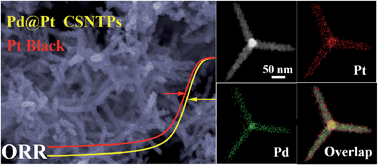Pd@Pt core–shell tetrapods as highly active and stable electrocatalysts for the oxygen reduction reaction†
Abstract
Enhancing the electrocatalytic activity and stability of cathodic Pt electrocatalysts in proton exchange membrane fuel cells is an attractive research topic because of the importance of the oxygen reduction reaction (ORR) in PEMFCs. In this work, Pd@Pt core–shell tetrapods (CSNTPs) are prepared by a facile seeded growth process. During the synthesis, Pd tetrapods act as seeds to guide the growth of the dendritic Pt shell. Various physical techniques confirm that the as-prepared Pd@Pt CSNTPs have a core–shell structure and surface dendritic morphology. Moreover, the electrocatalytic activity and durability of the Pd@Pt CSNTPs for the ORR in acidic media were systemically studied by various electrochemical techniques such as cyclic voltammetry, ORR polarization measurements, and accelerated durability test (ADT). After an 8000 cycle ADT, Pd@Pt CSNTPs only lose 13% of their initial electrochemical surface area, whereas commercial Pt black loses 78%. Compared to Pt black, Pd@Pt CSNTPs show remarkably enhanced electrocatalytic activity and durability for the ORR owing to their specific structural characteristics and the synergistic effect between the Pt shell and Pd core.


 Please wait while we load your content...
Please wait while we load your content...